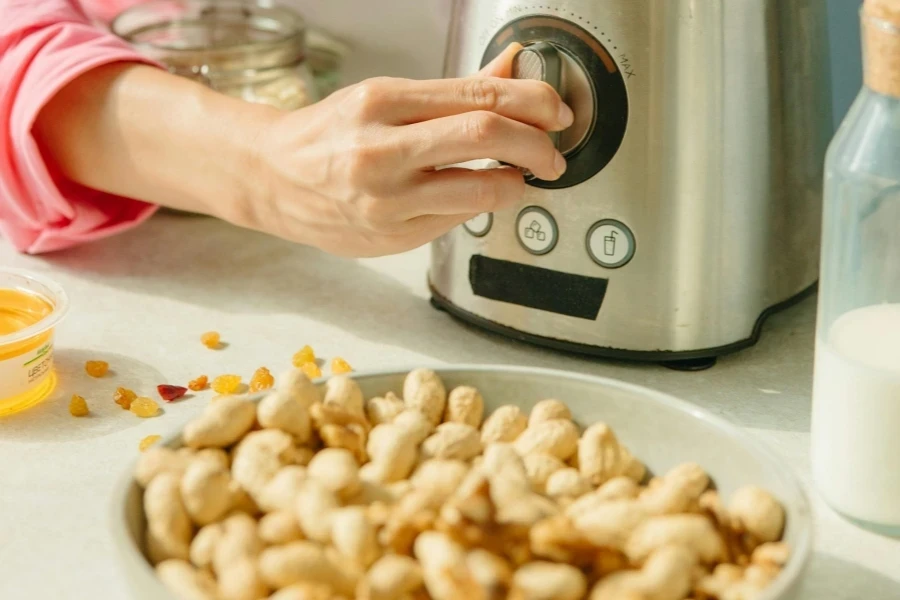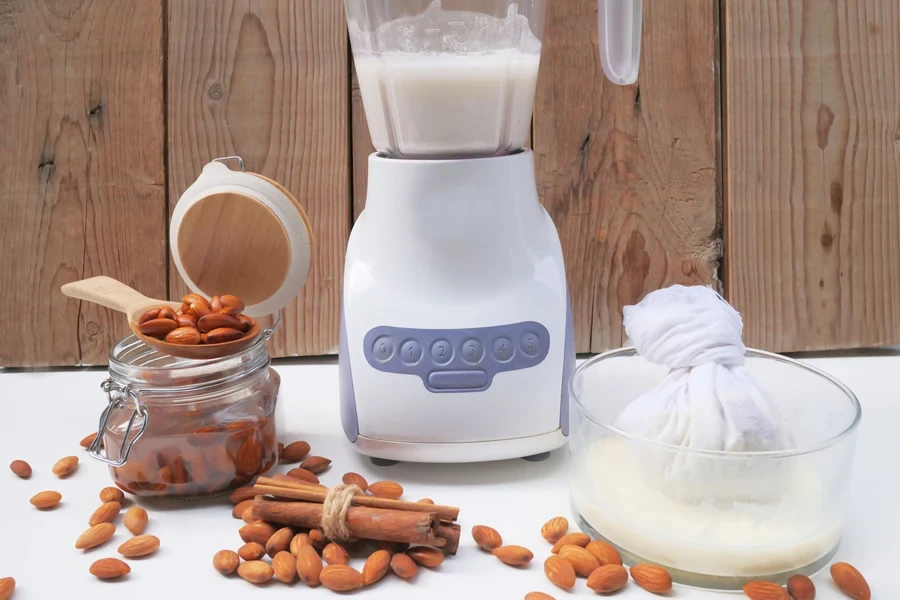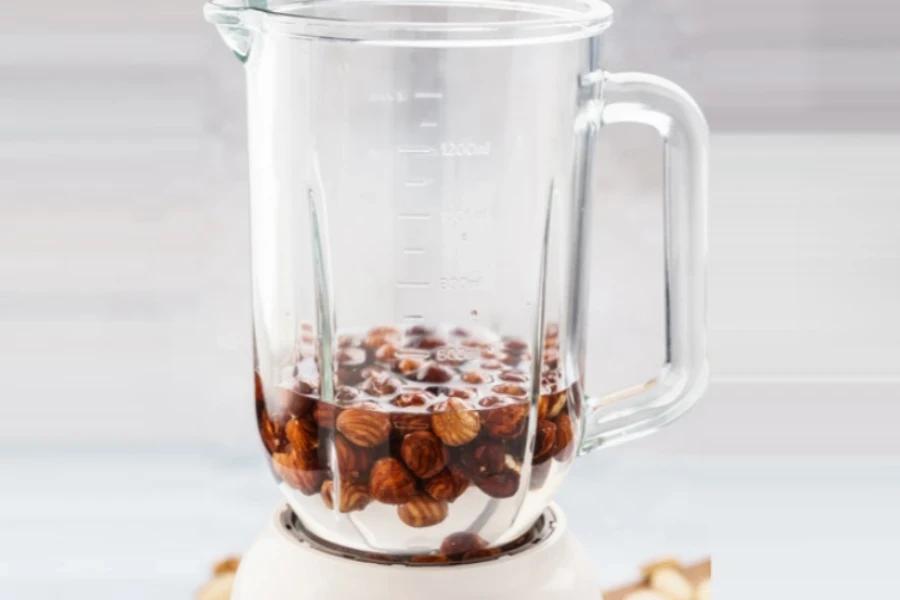For years, plant-based milk lovers relied on grocery stores for coconut, oat, soy, almond, and other non-dairy milks. The disadvantage was that store-bought milk often contained preservatives, added sugars, and thickeners, affecting its nutritional value, flavor, and texture.
With a nut milk machine, people could use fresh ingredients to make homemade plant milk tailored to their liking with fewer additives and more control over creaminess and flavor. Unlike a standard blender, which would require straining and additional steps to prepare a plant-based milk recipe, a nut milk maker streamlines the process.
Consumers are turning to nut milk machines for their health benefits, cost efficiency, and the ability to experiment with novel flavors. Plus, they help save money in the long run compared to purchasing store-bought milk regularly.
Table of Contents
The global nut milk maker market
The growing popularity of plant-based diets
Health and wellness trends
Sustainability and waste reduction
How to decide which nut milk makers to invest in
Performance and versatility
Ease of use and cleaning
Batch size and capacity
Energy efficiency
Durability
The top 6 nut milk machines to consider
1. Electric nut milk makers
2. Manual nut milk makers
3. Commercial automatic nut milk machines
4. Soy milk machines with nut milk functionality
5. High-powered blenders with nut milk capability
6. Specialty nut milk makers
Conclusion
The global nut milk maker market
With top chefs, home cooks, and vegan milk enthusiasts embracing the possibilities of a nut milk maker, it’s clear that this is the future of plant-based milk-making.
The global nut milk maker market was valued at USD 369 million in 2024 and is projected to reach USD 562 million by 2031, reflecting a compound annual growth rate (CAGR) of 6.3% during the forecast period. The growth of this market is influenced by:
The growing popularity of plant-based diets

An increasing number of individuals are embracing plant-based lifestyles, leading to heightened demand for alternatives like soy, oat, and almond milk. Nut milk makers empower users to prepare these beverages at home, letting them use fresh ingredients and customize their milk.
Health and wellness trends
The increase in health-conscious consumers has led to more additive-free, nutritious options. Homemade plant milk gives individuals control over ingredients, resulting in beverages free from unwanted preservatives but rich in vitamins and minerals..
Sustainability and waste reduction
Making nut milk at home reduces reliance on store-bought options and packaging waste. This promotes eco-friendly practices and aligns with the growing emphasis on sustainability and environmental responsibility.
How to decide which nut milk makers to invest in
Performance and versatility
Today’s customers prefer multifunctional appliances. Focus on machines with multiple settings to handle different kinds of nuts and even seeds like flax seeds and sesame seeds. Avoid stocking machines with limited capabilities, as customers value flexibility. Selecting a machine with soup settings or the ability to make homemade ice cream is a bonus.
Ease of use and cleaning
A plant milk maker with a complicated operation method will frustrate users. Choose convenient options with self-cleaning functions, reusable filters, and leak-proof silicone lids. Features like delayed start and select heat settings make homemade almond milk preparation even more convenient because users can soak nuts and start the process automatically.
Batch size and capacity
Businesses catering to cafes, restaurants, or bulk buyers need nut milk makers to produce a large amount of plant milk per cycle. Avoid investing in machines that only produce small batches. Go for machines with adjustable cups and ML measurements to enable users to make just the right batch of milk, whether they need a small portion for coffee or a larger supply for cooking.
Energy efficiency
A high-speed blender or nut milk machine should be energy-efficient to reduce electricity costs. Go for advanced models with a power reserve function to prevent overheating and ensure they last a long time.
Durability
Customers often assume all plant milk makers are the same. Educate them on the importance of durability, especially for machines that are used daily. Also, invest in machines built with stainless steel; they offer better performance than cheaper alternatives.
The top 6 nut milk machines to consider
1. Electric nut milk makers

Pushing a button is all it takes to get an electric nut milk machine to handle everything from grinding to straining nut milk. Machines with self-cleaning functions and reusable filters save time for anyone who wants to enjoy fresh coconut or oat milk without the effort.
They work well with almonds, cashews, soy, coconut, and even seeds like flax seeds. Users can add soaked nuts, cold water, and extra ingredients like vanilla or turmeric to get a smooth, creamy blend within minutes. Many electric models have a delay start option for home users and coffee lovers to prepare fresh milk by morning.
2. Manual nut milk makers

A manual nut milk maker is best for users who prefer a more hands-on approach. It requires extra effort, a pressing mechanism, and some muscle power applied to a filter basket. While it doesn’t offer the ease of use of electric models, it is affordable, portable, and great for sustainability-focused buyers.
Manual nut milk makers are best for health-conscious individuals, campers, and those who want plant milk free from electricity use.
3. Commercial automatic nut milk machines

Cafes, restaurants, and businesses producing large batches of plant-based milk need a commercial automatic nut milk machine for faster and creamier milk preparation. Health food stores with in-store cafés prioritize models with soup settings and built-in steamers for making hot chocolate. Go for models with glass carafes instead of plastic for better durability and flavor preservation.
4. Soy milk machines with nut milk functionality
While traditionally designed for soy milk, many modern soy milk makers also function as nut milk machines. This multifunctionality allows users to make almond, pistachio, hazelnut, and macadamia nut milk. Soy milk machines are sought after by households and businesses that love soy-based products and want to experiment with other non-dairy milks.
5. High-powered blenders with nut milk capability

Apart from blending smoothies, a high-speed blender is a great tool for making strawberry almond milk, homemade ice cream, and plant milk. Home cooks and creative food lovers who prefer thicker, creamier blends don’t mind its inability to separate pulp like other dedicated nut milk makers. This kitchen tool can be paired with a manual nut milk press for a smoother, pulp-free result.
6. Specialty nut milk makers
Specialty machines help extract flavor and nutrients when making walnut, sesame seed, pistachio, tiger nut, or other specific nut milk. These nut milk makers are used for specific nut bases and ensure that each batch retains the chosen ingredients, nutrients, vitamins, and minerals.
Offer these options to gourmet chefs and health-conscious consumers who want to experiment with matcha, cashew milk, chocolate-infused almond milk, or other novel flavors.
Conclusion
Investing in the right nut milk machines goes beyond buying a plant-based milk maker. There’s a growing demand for healthier, cost-efficient, and customizable plant-based milk options. Offering businesses highly efficient nut milk makers can help them produce creamy and nutritious flavors of plant milk, hummus, and guacamole for their customers while saving money.
Most models listed have advanced preferred features and can prepare creamy coconut milk, cashew milk, hazelnut milk, pistachio milk recipes, matcha-infused or turmeric-spiced drinks. Visit Alibaba.com to stock up on high-quality nut milk maker machines that offer functional benefits to your customers and position you as a trusted supplier.




